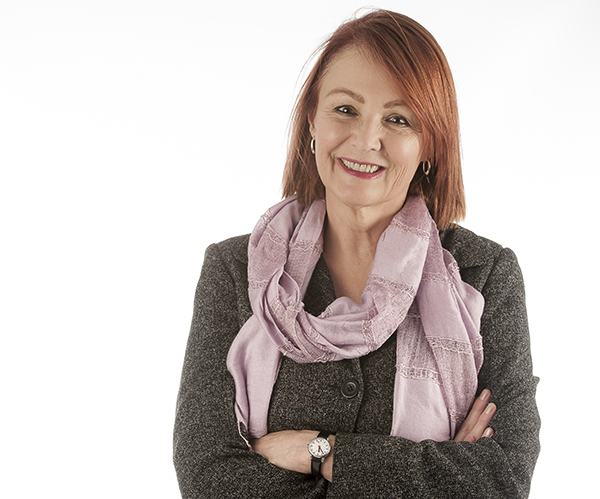Latest News Archive
Please select Category, Year, and then Month to display items
![]()
Prof Marian Tredoux, Associate Professor in the
Department of Geology at the University of the Free State,
recently had a mineral named after her.
Photo: Sonia Small
Prof Marian Tredoux is a geochemist and lecturer in the Department of Geology at the University of the Free State (UFS). Her research interests are rocks, particularly the chemistry of rocks and the minerals they are composed of – chemicals similar to those found in laboratories, although they occur in nature.
Prof Tredoux started her research career at the University of the Witwatersrand (Wits), after which she spent a number of years at the University of Cape Town (UCT). For the past 11 years, she has been at the UFS, which has brought her in close proximity of her primary field-research area in Barberton. This fascinating part of the country has been the focus of her research for 30 years. She has always been intrigued by the earth's crust in this area, which she describes as "very old, very strange, and very interesting".
Prof Tredoux has been collaborating with colleagues and peers overseas in an attempt to unravel the intricacies of this unusual geological area. Some of these colleagues recently discovered a new mineral in one of the rock formations of the Barberton mountain range. They decided to name the mineral after Prof Tredoux, dubbing it tredouxite. "I am very honoured by this, and very grateful that all these years of collaboration are being acknowledged," Prof Tredoux said.
Research chair into Higher Education gets boost for five more years
2017-11-21

Prof Melanie Walker, Director of the Centre for Research on
Higher Education and Development (CRHED).
Photo: Supplied
The research Chair in Higher Education and Human Development within the Centre for Research on Higher Education and Development (CRHED) at the University of the Free State has secured funding for another five years. It follows a favourable evaluation by the South African Research Chairs Initiative (SARChI) of the research project at the UFS.
The Director of the Centre, Prof Melanie Walker, says she is delighted by the recognition of the Chair's hard work and significant productivity. “This new round of funding secures the centre and its activities for the next five years.”
Under the auspices of the Chair, research is conducted on higher education, inequalities and social justice, and how or if universities foster the human capabilities and aspirations of students. In essence, the research studies whether higher education makes a difference to the lives of students, their families and communities. Prof Walker says the Chair's projects look at issues of access, participation and transitions into work, as well as gender, race and social class. The research uses quantitative and qualitative methods and includes a strand of participatory research projects with students.
Prof Walker says through the Chair research project, and the Centre, researchers have developed extensive international links and produced international quality research and publications. “We foster high-quality PhD graduates as a new generation of social science academics.” The Chair has in the first five years produced 10 PhDs and four master’s students.
The project in the next five years will continue with its focus on higher education and human development research. Prof Walker says all the research efforts seek to contribute to more justice in society and universities and to contribute to debates, policy and practices in higher education and a scholarly knowledge base.
The Research Chairs Initiative aims to improve the research capacity at public universities to produce high-quality postgraduate students, research and innovative outputs. The assessors looked at features such as the number of students the research entity had trained and how many publications the research team had produced.